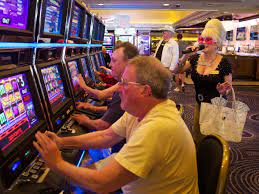
Introduction:
Slot machines, often referred to as the “one-armed bandits,” have long been a staple in the world of gambling and entertainment. These ubiquitous devices can be found in casinos, bars, airports, and even online kapuas88, captivating players with their flashing lights, enticing sounds, and promise of instant wealth. However, behind the glitz and glamour lies a complex industry shrouded in controversy and debate. In this article, we delve into the history, mechanics, psychology, and social impact of slot machines.
A Brief History:
The origins of slot machines can be traced back to the late 19th century when a mechanical engineer named Charles Fey invented the first-ever slot machine in 1895. Known as the “Liberty Bell,” Fey’s creation featured three spinning reels adorned with symbols like horseshoes, diamonds, spades, hearts, and his trademark liberty bell. Despite initial skepticism, the Liberty Bell became immensely popular and laid the foundation for the modern-day slot machine.
Over the decades, slot machines evolved from mechanical contraptions to sophisticated electronic devices powered by computer software. The introduction of video slots in the 1970s revolutionized the industry, allowing for more elaborate graphics, animations, and bonus features. Today, the proliferation of online casinos has further expanded the reach of slot machines, making them accessible to players around the world with just a few clicks.
Mechanics of Slot Machines:
At their core, slot machines operate on a simple principle: players wager money and spin the reels, hoping to land winning combinations of symbols. Behind the scenes, a random number generator (RNG) determines the outcome of each spin, ensuring fairness and unpredictability. Modern slot machines feature a multitude of paylines, bonus rounds, and special symbols, offering players various ways to win.
One of the defining characteristics of slot machines is their return-to-player (RTP) percentage, which represents the long-term payout percentage of the game. While RTP varies from one slot to another, most machines have RTPs ranging from 90% to 98%, meaning that, on average, players can expect to get back a certain percentage of their wagered money over time. However, it’s essential to understand that RTP is a theoretical concept and does not guarantee individual results.
Psychology of Slot Machines:
Slot machines are carefully engineered to exploit certain psychological principles and keep players engaged for extended periods. One of the most potent psychological mechanisms at play is intermittent reinforcement, whereby players receive rewards at unpredictable intervals, leading to a dopamine rush and reinforcing the behavior of playing.
Additionally, the use of vibrant colors, flashing lights, and celebratory sounds creates a sensory overload that heightens excitement and arousal. Slot machines also employ near-miss programming, where the reels stop just short of a winning combination, tricking players into believing that they were close to a jackpot. These psychological tactics, combined with the allure of potential riches, can make slot machines highly addictive for some individuals.
Social Impact and Controversies:
Despite their popularity, slot machines have drawn criticism from various quarters due to their perceived negative social impact. Critics argue that these machines disproportionately target vulnerable populations, such as low-income individuals and problem gamblers, exacerbating financial hardships and addiction issues.
Furthermore, some studies suggest that the rapid pace of play and continuous reinforcement provided by slot machines can lead to pathological gambling behavior and other mental health problems. In response to these concerns, regulators have implemented measures such as mandatory warning labels, self-exclusion programs, and limits on stake sizes and betting frequencies.
Conclusion:
Slot machines occupy a unique place in the realm of gambling, blending elements of chance, psychology, and technology to create an immersive and often controversial experience. While these devices offer entertainment and excitement to millions of players worldwide, they also raise important questions about responsible gambling, consumer protection, and societal well-being. As the debate surrounding slot machines continues, it is essential to strike a balance between enjoyment and harm prevention in this ever-evolving industry.